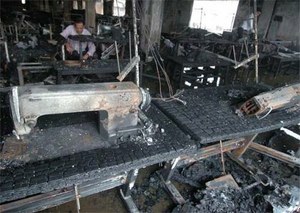WELCOME TO THE ARCHIVE (1994-2014) OF THE MAQUILA SOLIDARITY NETWORK. For current information on our ongoing work on the living wage, women's labour rights, freedom of association, corporate accountability and Bangladesh fire and safety, please visit our new website, launched in October, 2015: www.maquilasolidarity.org
March 10, 2010
Following a horrific factory fire that killed 21 employees of a garment factory in Bangladesh, the factory workers are demanding swift reforms, a criminal investigation and compensation for the victims. Support these workers' demands by writing to the Government of Bangladesh and international fashion brands sourcing from this factory.

Garib & Garib Sweater factory - March 2010
On Thursday, February 25, 2010, twenty-one workers died when the Garib & Garib Sweater Factory in Gazipur, Bangladesh, caught fire for the second time in six months.
Please join us today in calling upon the brands, the employer and the government of Bangladesh to take immediate action to ensure justice for the victims, and to prevent these tragedies from occurring in the future.
A government-authorized probe into the cause of the fire said the fire was started by an electric short-circuit on the second floor of the factory. It quickly spread to the other floors filled with inflammable materials such as wool threads and other goods. Lasting nearly two hours, the fire created a thick black smoke and consumed the oxygen in the air, suffocating the workers. The smoke could not escape because of poor ventilation and the presence of unauthorized sheet metal structures that were being used for storage of highly inflammable materials on the roof of the building. Workers could not escape because exits were locked and materials blocked the stairways. The factory's fire-fighting equipment was "virtually useless", according to the Dhaka Fire Service and Civil Defence, and reportedly none of the security guards on duty knew how to operate fire extinguishers and hydrants.
On March 7, families of the deceased workers received 200.000 Taka (approximately 2085 Euro) in compensation. The injured workers have been admitted to several hospitals in the Dhaka area. There is no news yet about whether these first steps will be followed by further compensation measures, as 200.000 Taka is not sufficient. Further compensation is needed in the longer term for both the seriously injured workers and the families of the deceased workers. The factory will remain closed for the month of March. As of March 10, the Garib workers have received full payment of wages for the month of February (including the days after the fire broke out), but are awaiting further payment of wages for the remaining period the factory stays closed.
The Clean Clothes Campaign (CCC) and the Maquila Solidarity Network (MSN) have contacted international garment companies that reportedly sourced from Garib & Garib Sweater Ltd. Both Mark's Work Wearhouse and Wal-Mart informed MSN that they stopped sourcing goods from the factory after a fire last year demonstrated the company had serious health and safety issues.
The Swedish H&M responded to the CCC that they are working together with another current buyer, the Italian company Teddy (owner of the brand Terranova), on compensation of the injured workers and the families of the deceased. We welcome the first steps taken by these companies to respond to the needs of the workers and their families, and urge all buyers to ensure a longer term approach is taken regarding financial compensation which involves unions and workers' organisations.
The fact that H&M denies that structural safety problems existed at Garib & Garib is worrisome, however. According to their October 2009 audit there were clearly marked escape routes and emergency exits, as well as fire extinguishers.
The inadequacy of the audit system could not be more clearly demonstrated. It has been the critique from the labour movement for the last decade that the audit system fails to detect lack of compliance on a day-to-day basis. Just ticking off the existence of escape routes does not help if stairways are blocked with materials. Likewise the availability of fire extinguishers is not enough when nobody is trained to use them. Involving workers in monitoring health and safety conditions therefore remains a fundamental prerequisite to ensure that incidents like this are prevented in the future.
In addition, given the repeated lethal incidents in the garment industry in Bangladesh, it is no longer defensible that audit reports detecting shortcomings in safety standards are kept private. The industry should become more transparent and accountable to the workers concerned, and disclose audit reports to workers' unions, the government and other stakeholders involved.
Sadly, this fire was not only preventable, it was predictable, and therefore in no way can we call it an accident. Since 2000, Bangladeshi organisations, the CCC and MSN have been calling for a review of all Bangladeshi garment factories following similar fatal accidents, all sharing the same hallmarks - including blocking of stairways with goods and materials, locking of factory gates, bad ventilation, missing or inappropriate fire extinguishing equipment and lack of personnel trained in emergency operations. However, to date neither the government, the Bangladesh Garment Manufacturers and Exporters Association (BGMEA) nor the international buyers have taken sufficient steps to address the structural and systemic problems in the garment industry.
We therefore fully support the demands from Bangladeshi unions and workers' organisations to the Garib & Garib owner, the government, the BGMEA and the international buyers to:
In addition, we call upon the government of Bangladesh to:
And we call upon the international fashion companies ordering at Garib & Garib to:
Please take action now! Send letters to the owner of Garib & Garib Sweater Ltd, the government of Bangladesh, the BGMEA and international buyers H&M and Teddy.
More information: